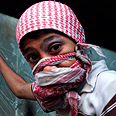
Morsi opponents clash with police in Cairo
Violence flares as thousands rally across Egypt in protest against president's power grab
Opponents of Egyptian President Mohammed Morsi clashed with Cairo police on Tuesday as thousands of protesters stepped up pressure on the Islamist to scrap a decree they say threatens Egypt with a new era of autocracy.
Police fired tear gas at stone-throwing youths in streets off the capital's Tahrir Square, heart of the uprising that toppled Hosni Mubarak last year. Protesters also turned out in Alexandria, Suez, Minya and cities in the Nile Delta.
Related stories:
- Egypt presidency: Morsi decrees 'temporary'
- Report: Egypt army officers back anti-Morsi protests
- Egypt judges announce strike protesting Morsi decree
A 52-year-old protester died after inhaling teargas in Cairo, the second death since last week's decree that expanded Morsi's powers and barred court challenges to his decisions.
Tuesday's protest called by leftists, liberals and other groups deepened the worst crisis since the Muslim Brotherhood politician was elected in June, and exposed a divide between the newly empowered Islamists and their opponents.
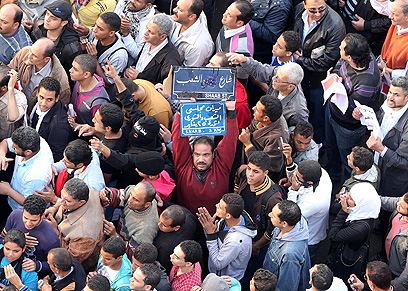
March in Cairo (Photo: EPA)
Some protesters have been camped out since Friday in Tahrir Square, and violence has flared around the country, including in a town north of Cairo where a Muslim Brotherhood youth was killed in clashes on Sunday. Hundreds have been injured.
Morsi's move provoked a rebellion by judges and battered confidence in an economy struggling after two years of turmoil.
Opponents have accused Morsi of behaving like a modern-day pharaoh, a jibe long leveled at Mubarak. The United States, a benefactor to Egypt's military, has expressed concern about more turbulence in a country that has a peace treaty with Israel.
Morsi's administration has defended his decree as an effort to speed up reforms and complete a democratic transformation. Opponents say it shows he has dictatorial instincts.
"The people want to bring down the regime," protesters chanted, echoing slogans used in the anti-Mubarak uprising.
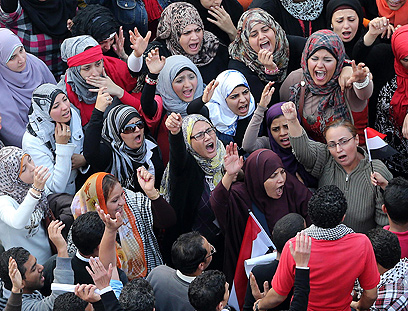
Protesters in Tahrir Square (Photo: EPA)
"We don't want a dictatorship again. The Mubarak regime was a dictatorship. We had a revolution to have justice and freedom," said 32-year-old Ahmed Husseini.
The protest was a show of strength by the non-Islamist opposition, whose fractious ranks have been pushed together by the crisis. Well-organized Islamists have consistently beaten more secular-minded parties at the ballot box in elections held since Mubarak was ousted in February 2011.
Near-absolute power
Some scholars from the prestigious al-Azhar mosque and university joined Tuesday's protest, showing that Morsi and his Brotherhood have alienated some more moderate Muslims. Members of Egypt's large Christian minority also joined in.
Morsi formally quit the Brotherhood on taking office, saying he would be a president for all Egyptians, but he is still a member of its Freedom and Justice Party.
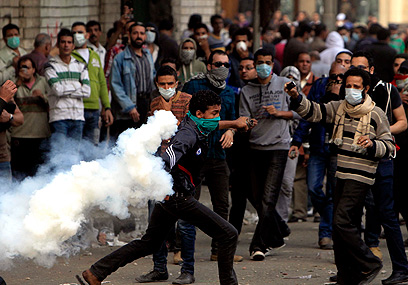
Protesters clash with police (Photo: Reuters)
The decree issued on Thursday expanded his powers and protected his decisions from judicial review until the election of a new parliament expected in the first half of 2013.
New York-based Human Rights Watch said it gives Morsi more power than the interim military junta from which he took over.
UN Secretary-General Ban Ki-moon noted judges challenged the decree. However, he told Austria's Die Presse newspaper: "I have also noted that Morsi wants to resolve the problem in a dialogue. I will encourage him to continue to do so."
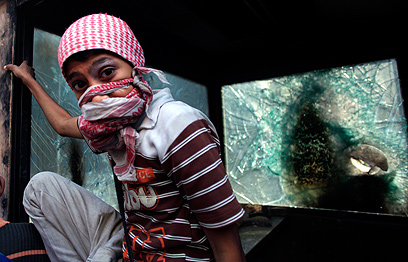
Young protester takes cover (Photo: AP)
Trying to ease tensions with judges outraged at the step, Morsi has assured Egypt's highest judicial authority that elements of the decree giving his decisions immunity would apply only to matters of "sovereign" importance. Although that should limit it to issues such as a declaration of war, experts said there was room for much broader interpretation.
In another step to avoid more confrontation, the Muslim Brotherhood cancelled plans for a rival mass protest in Cairo on Tuesday to support the decree. Violence has flared in the past when both sides have taken to the streets.
But there has been no retreat on other elements of the decree, including a stipulation that the Islamist-dominated body writing a new constitution be protected from legal challenge.
Morsi has repeatedly stated the decree will stay only until a new parliament is elected - something that can happen once the constitution is written and passed in a popular referendum.
- Receive Ynetnews updates directly to your desktop










